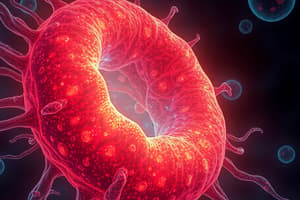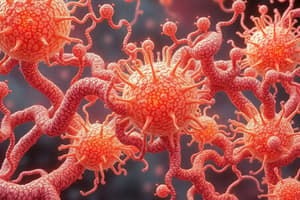Podcast
Questions and Answers
What is the fundamental unit of life according to the cell theory?
What is the fundamental unit of life according to the cell theory?
- Cells (correct)
- Organelles
- Molecules
- Atoms
Why do larger cells undergo cell division?
Why do larger cells undergo cell division?
- To increase their size for better functioning
- To maintain a stable surface area to volume ratio (correct)
- To generate energy for the cell
- To replicate genetic material
What is the main function of stem cells in multicellular organisms?
What is the main function of stem cells in multicellular organisms?
- Producing energy for the organism
- Supporting the structure of the organism
- Creating specialized cells through gene expression (correct)
- Regulating the organism's temperature
In what context can stem cells be used for therapies?
In what context can stem cells be used for therapies?
What is the exception to the cell theory regarding cell formation?
What is the exception to the cell theory regarding cell formation?
Why do cells have to maintain a stable surface area to volume ratio?
Why do cells have to maintain a stable surface area to volume ratio?
What role do stem cells play in generating new tissues for severe burns?
What role do stem cells play in generating new tissues for severe burns?
Which function of life does Paramecium, a single-celled organism, demonstrate?
Which function of life does Paramecium, a single-celled organism, demonstrate?
In what context can stem cells be a subject of ethical debate?
In what context can stem cells be a subject of ethical debate?
What is the significance of cell differentiation within multicellular organisms?
What is the significance of cell differentiation within multicellular organisms?
Why is biology considered to be founded on principles from physics and chemistry?
Why is biology considered to be founded on principles from physics and chemistry?
Why can't cells get too large?
Why can't cells get too large?
What are the functions of life?
What are the functions of life?
How can stem cells be used for treating Stargardt's disease?
How can stem cells be used for treating Stargardt's disease?
What is the significance of the surface area to volume ratio for larger cells?
What is the significance of the surface area to volume ratio for larger cells?
What are the principles on which biology is founded?
What are the principles on which biology is founded?
What is the role of cell differentiation in multicellular organisms?
What is the role of cell differentiation in multicellular organisms?
What are the exceptions to the cell theory regarding cell formation?
What are the exceptions to the cell theory regarding cell formation?
What is the main function of stem cells in multicellular organisms?
What is the main function of stem cells in multicellular organisms?
What ethical debates exist regarding the sources of stem cells?
What ethical debates exist regarding the sources of stem cells?
Flashcards are hidden until you start studying
Study Notes
- Biology is the study of living things, founded on principles from physics and chemistry.
- Life is composed of cells, which are the smallest unit of life.
- Cells have specific parts, and all living things are made up of cells or cell-like products.
- Cell theory states that all cells come from pre-existing cells via cell division.
- Exceptions to this rule include striated muscle fibers with multiple nuclei, and large algae considered as single cells.
- Functions of life include reproduction, metabolism, responsiveness, homeostasis, growth, excretion, and nutrition.
- Paramecium, a single-celled organism, can meet all the requirements of life.
- Cells cannot get too large, as they would not be able to support themselves and maintain homeostasis.
- Larger cells undergo cell division to maintain a stable surface area to volume ratio.
- Stem cells are precursor cells that can turn into multiple specialized cells through gene expression.
- Cell differentiation creates specific cells with specific functions within multicellular organisms.
- Stem cells can be used for various therapies, such as generating new tissues for severe burns.
- Ethical debates exist regarding the sources of stem cells, specifically human embryos.
- Stargardt's disease, an inherited condition causing vision loss, can be treated with stem cell-derived photoreceptors.
Studying That Suits You
Use AI to generate personalized quizzes and flashcards to suit your learning preferences.





